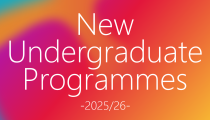Sept 2025 Entry
2 years
Normally 70 credits depending on the student's entry qualification
(plus 2 training credits of Work-Integrated Education)
What's New
Programme Aims
The programme is concerned with turning large scale data into intelligence through the application of cutting-edge techniques in mathematics, statistics and computer science. The aim is to produce graduates with expertise that cuts across the core disciplines of mathematics, statistics and computer science. The programme emphasises the critical arc that runs from data to information, information to knowledge, and knowledge to decision making.
Characteristics
Our articulation programme is focused on the acquisition of analytical skills based on mathematics, statistics and computing, and their application to the management and analysis of data, as well as to the discovery of lawfulness from very large data sets or systems, now generally referred to as Big Data. Upon successful completion of the programme, students should be able to manage massive datasets and help to make appropriate decisions in whatever careers they pursue.
Career Prospects
BSc (Hons) in Data Science and Analytics programme is designed to develop students’ analytical, critical thinking, problem-solving and communication skills, which enables them to pursue a variety of careers in areas such as IT, retail, urban planning, healthcare, marketing and research, consultancy, government and public utilities. Graduates can also pursue further studies in postgraduate programmes locally or overseas.
Professional Recognition
- Graduates can apply for partial exemption from the professional assessment of Hong Kong Statistical Society (HKSS), and Royal Statistical Society (RSS).
Students must complete all of the Discipline-Specific Requirement (DSR) and General University Requirement (GUR) subjects to fulfil the credit requirement for graduation, except those who are given credit transfers due to their prior study.
(A) DSR subjects
It comprises Compulsory Subjects and Elective Subjects as listed below:
Compulsory Subjects* (At least 13 subjects with total 40 credits)
- Big Data Analytics
- Capstone Project
- Data Mining and Data Warehousing
- Decision Analysis
- Further Mathematical Methods
- High Dimensional Data Analysis
- Operations Research Methods
- Optimization Methods
- Professional Communication in Chinese for Applied Science
- Professional English for Data Science and Analytics Students
- Programming for Data Science
- Statistical Inference
- Statistical Machine Learning
*Admitted students with insufficient background in mathematics, statistics or/and computer programming are required to pass the underpinning subject(s) Applied Linear Models / Data Analytics and Visualization / Data Structures / Database Systems / Introduction to Statistics / Multivariable Calculus / Principles of Programming / Probability & Distributions, or the equivalent.
Elective Subjects (At least 7 subjects with total 21 credits)
- Artificial Intelligence
- Business Intelligence and Customer Relationship Management
- Cell Technology for Biomedical Research
- Cells in Health and Disease
- Compressed Sensing
- Computational Methods
- E-commerce Technology and Applications
- Environmental Impact and Assessment
- Forecasting and Applied Time Series Analysis
- Geographic Information Science
- Human Genetics
- Information Systems Audit and Control
- Intelligent Transportation Systems
- Medical Informatics
- Modelling of Epidemic and Pandemic
- Radiographic Imaging Science
- Remote Sensing
- Remote Sensing of the Environment
- Simulation
- Spatial Big Data Analytics
- Stochastic Processes for Investment
- Survey Sampling
- Urban Informatics and City Planning
- Urban Planning (Workshops)
-
Web Application Design and Development
(B) GUR Subjects^ (9 credits)
The GUR subjects comprise 6 credits of Cluster-Area Requirement (CAR) subjects; 3 credits of Service Learning (SL) subjects; and non-credit bearing of Essential Components of General Education (Academic Integrity, Artificial Intelligence and Data Analytics, Innovation and Entrepreneurship, and National Education).
^ Extra credit bearing subject - Students not meeting the equivalent standard of the Undergraduate Degree Language Communication Requirements (LCR) based on their previous academic performance in AD/HD programmes will be required to take additional credits (English and/or Chinese) on top of the programme's normal credit requirement.
(C) Work-Integrated Education (2 training credits)
Students are required to spend a minimum of three weeks or 120 hours working in firms either during summer vacation or as part-timers. Discipline-related summer placements may be found in Hong Kong, the Chinese Mainland or overseas. These, and other forms of work experience, can be counted towards the WIE requirement, subject to the approval of the department.
Normally 70 credits depending on the student's entry qualification
(plus 2 training credits of Work-Integrated Education)
(Subject to confirmation)
An appropriate Associate Degree or a Higher Diploma in IT, statistics, engineering, science or business from a recognised institution.
For further programme information, please contact
the General Office (tel.: 3400 3275; email: dsai.ug@polyu.edu.hk).
Click here for the template
Aims: To evaluate the potential for and interest of applicants in the programme, and to test their communication skills and general knowledge relevant to the programme.
Duration: 30-45 minutes
Remarks: Applicants may be invited to interviews. No make-up interviews or earlier interviews will be arranged for applicants who fail to attend the scheduled interviews.





